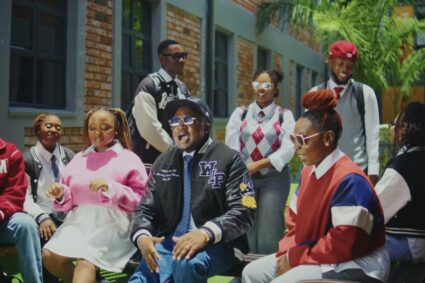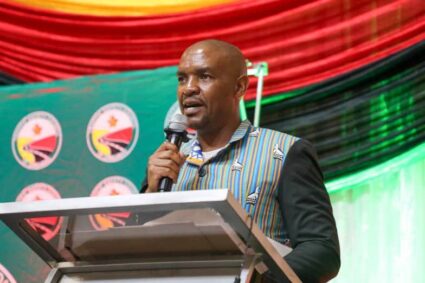
The room was filled with professionals from all walks of life, people who shape policies, influence hiring, and determine who gets a seat at the table. They had gathered for a Disability Sensitization Workshop, primarily targeting private sector companies, expecting a training session. The workshop took place on March 14, 2025, at the Monomotapa Hotel in Harare, Zimbabwe.
By the end, it became clear: this was not just a workshop. It was a confrontation, a mirror held up to a society that has, for too long, looked the other way. This was not about surface-level awareness. It was about responsibility. Action. Systems that work for everyone, not just those for whom society has conveniently designed them.
One by one, the speakers took the floor, representatives from National Association for the Care of the Handicapped (NASCOH), Federation of Organizations of Disabled People in Zimbabwe (FODPZ), Deaf Women Included, Sightsavers, and the Ministry of Public Service, Labour & Social Welfare. Each voice carried weight.
Then, Elisa Ravengai stepped forward.
Elisa has a visual impairment, yet the clearest voice in the room, unapologetically bold, deliberate with every word. She did not come to be pitied. She came to challenge.
“I am not here for sympathy,” she began.
A hush fell over the audience.
“I am here for accountability. Are you willing to change how you think, how you hire, how you lead? Or will you leave this room unchanged, just another bystander in a world designed for the few?”
She paused. No one moved.
“Disability is not a tragedy. It is not an individual burden to overcome. The real tragedy is exclusion, when workplaces, schools, and public spaces tell us we do not belong,” said Elisa.
Elisa stood tall. Elisa is the Disability Inclusion Specialist at FODPZ.
“Some of you might be thinking, ‘This issue does not concern me.’ But let me remind you: We are all just a second away from disability. A car accident. A stroke. A degenerative disease. It is not something that happens to ‘others.’ It can happen to anyone, at any time. So, what kind of world are you building? A world that excludes, or a world that adapts?”
Disability Is Not the Problem, Exclusion Is
When I stepped into the room, I thought I knew what disability was. I had never truly understood that what many of us call “disability” is, in fact, impairment. Society has told one of the greatest lies.
From this workshop, I learnt that: Impairment + Barriers = Disability
Let me bring this home with a few examples:
• A person using a wheelchair is not disabled by their legs. They are disabled when an office has no ramp.
• A person with a visual impairment is not disabled by their eyes. They are disabled when workplace systems do not offer screen readers.
• A person with a hearing impairment is not disabled by their ears. They are disabled when critical meetings do not have sign language interpretation.
The formula presented in the workshop was simple:
👉 Impairment + Barrier = Disability
👉 Impairment + Access = Inclusion
Disability is not an individual’s limitation. It is society’s failure to accommodate. Therefore, inclusion is not an act of charity, it is an act of justice.
The Silent Cost of Invisibility
Perhaps the most unsettling moment of the workshop occurred during the discussion on invisible disabilities, many of which most of us have been struggling with. To name just a few: mental health conditions, chronic illnesses, and neurological disorders. “You do not have to see a struggle for it to be real,” Elisa said.
Too often, businesses assume that disability is something visible. What about the employee struggling with anxiety, afraid to disclose? What about the professional with epilepsy, managing in silence?
If your hiring practices do not make space for these individuals, you are not just excluding talent, you are actively shrinking your company’s potential. Elisa went on to dismantle the challenges, one by one.
The four major barriers blocking true inclusion that she highlighted are:
- Attitudinal Barriers – The unspoken biases that suggest persons with disabilities are “too difficult” to hire, “too fragile” to lead, or that accommodations are “too expensive.”
- Physical Barriers – Buildings without ramps, inaccessible toilets, offices designed as if only one kind of body exists.
- Systemic Barriers – Hiring processes that exclude. Promotion structures that overlook. A business culture that claims to be inclusive but never proves it.
- Communication Barriers – Websites without alt text. Documents not available in Braille. Meetings where the loudest voice gets heard, while others are left behind.
Reasonable Accommodation as a Game Changer
Elisa turned to the audience. “What do you picture when you hear the words ‘reasonable accommodation’?” Many responded, some fairly, some not quite.
“For many of you, it sounds like an inconvenience. A special request. But let us be clear, reasonable accommodation is not about giving special treatment. Denying reasonable accommodation is discrimination,” highlighted Elisa. She went on to explain that reasonable accommodation refers to necessary and appropriate modifications or adjustments that ensure persons with disabilities can fully participate in work, education, or public life on an equal basis with others. These are not luxuries, they are the difference between exclusion and participation.
Some examples include:
- A flexible work schedule for an employee managing a chronic illness.
- A screen reader for an analyst with visual impairment.
- An interpreter for a manager with hearing impairment, in a strategy meeting.
- A standing desk for someone with a spinal condition.
We cannot fix a system by merely adding ramps to a world designed without Persons with Disabilities (PwDs). We all have a part to play in rebuilding the way we think about inclusion.
Elisa’s Message Was Clear. Hire differently. Not as a favor, but as a commitment to diverse talent. Design accessibly. From websites to office spaces, universal design benefits everyone. Normalize accommodations. A wheelchair ramp is not “special treatment.” It is basic infrastructure. Shift the mindset. Inclusion is not about “helping” people, it is about fixing a broken system. As the workshop drew to a close, Elisa left the room with one final, unshakable truth. “We are just a second away from disability. I hope you leave here today knowing that inclusion is not an act of kindness. It is an act of justice and it starts with you.”
With the same certainty with which she entered, Elisa Ravengai walked off the stage, not just as an inspiration and, if I may add, an acquired new friend (chuckle), but as an equal, demanding change.
Final Thought
What will you do? The question is no longer whether disability inclusion matters because it does.
The real question is: Are you going to be a bystander, or are you going to be a barrier breaker?
The choice is yours.



